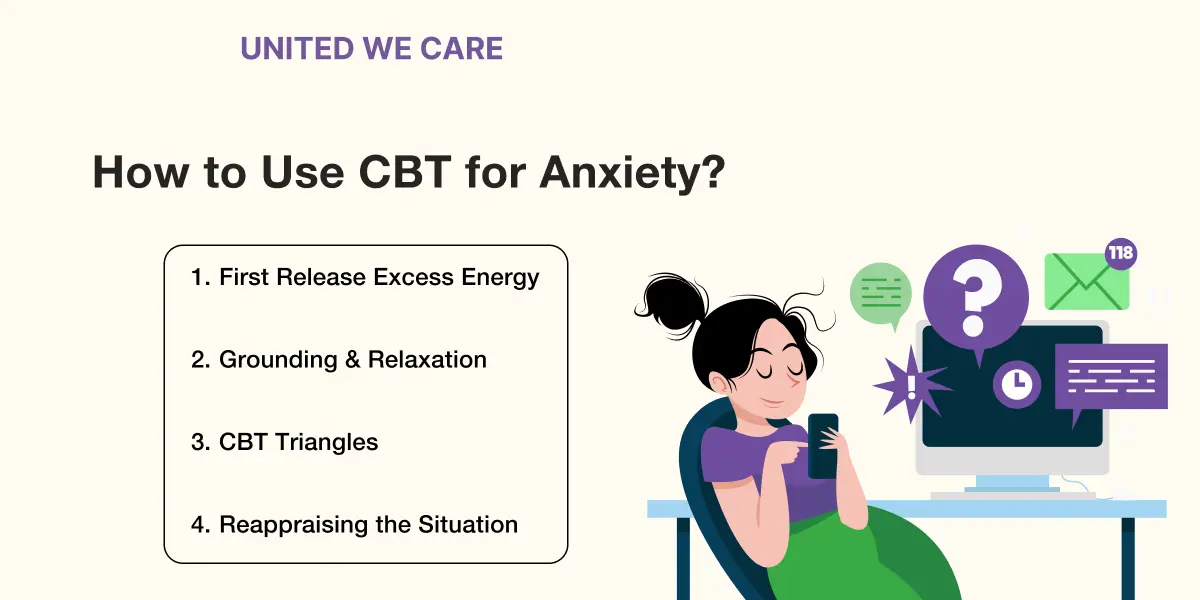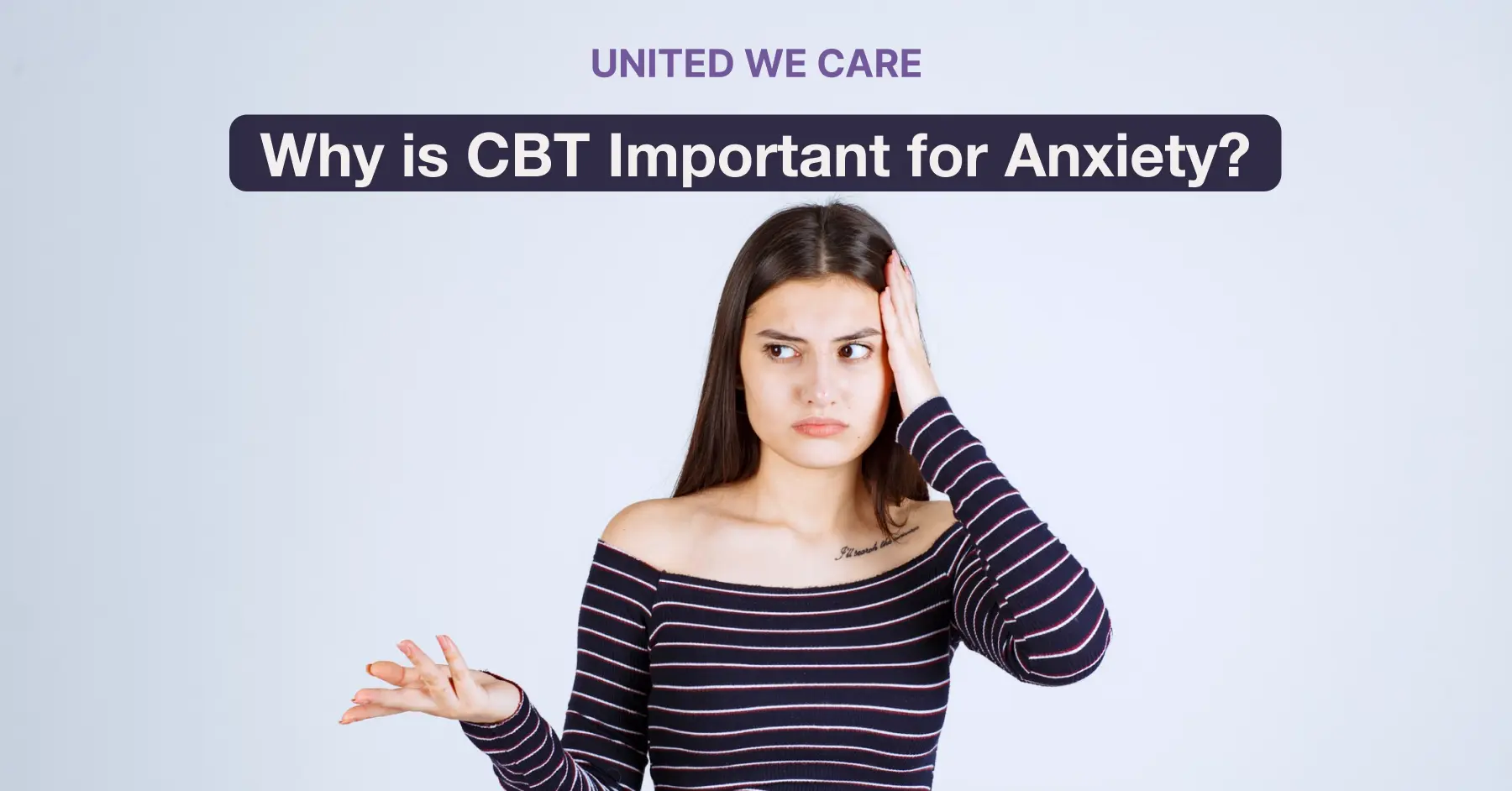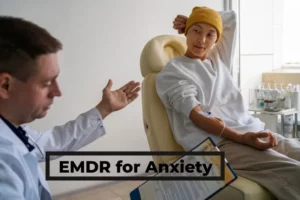Introduction
We live in a world where mental problems like anxiety are pretty prevalent. Almost 4 percent of the current population suffers from anxiety. In order to prevent it, Cognitive Behavioural Therapy has been introduced. In addition, the main goal of CBT is to find practical solutions to anxiety triggers and symptoms and learn from them.
CBT for anxiety
Now, let’s learn a bit more in-depth about CBT. The main aim of CBT is to find practical solutions to anxiety triggers and symptoms. As a rule, it aims to help clients manage anxiety independently even after the treatment. During CBT, you focus on building skills to tackle problematic situations without avoidance.
Particularly, CBT breaks overwhelming problems down and turns them into smaller and manageable parts. It works collaboratively with its patients to set goals and solve the current difficulties. Including the above, it also aims to change the negative thought cycles that cause anxiety. It tries to interrupt problematic patterns early before they get even worse.
CBT helps provide the patients with more education on their anxiety disorder. This helps them set expectations for their treatment and proposed course. Being more aware of the issue only helps in dealing with it better. So, undoubtedly, CBT can control anxiety and guide you in dealing with it better.
Why is CBT important for anxiety?
The practice of CBT is considered the “gold standard” treatment for anxiety. It has the most evidence available to prove that it works. Moreover, it has been shown that CBT reduces symptoms of general anxiety and panic disorders.
Coupled with this, it teaches its patients to recognize and interrupt their negative thought cycles. It helps change emotion and behavior patterns by changing your thoughts. The main goal of CBT is to focus on current problems and find their practical solutions.
Also, it gives its clients the advantage of building skills to tackle anxiety even after the treatment is over, which makes the patient more independent. After all, CBT is a well-structured and skill-focused short-term treatment, but it depends on the severity of the situation. The best part about CBT is that, in most cases, it allows anxiety to be managed without any medication.
1. How does CBT Work for Anxiety?
In this section, we will describe three key ways in which CBT helps individuals with anxiety. Keep in mind that these aspects only play out if one practices CBT on a regular basis over a prolonged period of time.
2. Recognizing Unhelpful Thinking Patterns
Firstly, the main benefit of practicing CBT is that you will learn to identify your thinking patterns. In that process, you will be able to figure out which thoughts lead to more negative thought cycles.
CBT will help you lower anxiety by catching yourself thinking in those unhelpful ways. You will learn how to spot cognitive distortions and recognize which type of unhelpful thought trap you’re getting stuck in.
3. Replacing Them With Healthier Thoughts
Next, the process of CBP requires you to learn how to replace unhealthy thinking patterns with helpful ones. As you work with your therapist on practicing CBT, you will learn how to look at the same situation differently.
Interestingly, this does not mean that you will fill yourself with false positivity or lie to yourself. Instead, you look at things objectively and try to find areas that you can change while letting go of those that you can’t.
Challenging Anxious Thoughts
CBT can be quite fun as well! There are several worksheets that allow you to apply the principles of CBT to your unique circumstances. These worksheets help you to challenge the specific anxious thoughts plaguing your mind.
It allows you to think of the worst possible scenario, the best possible scenario, and the most realistic outcome. You also start questioning the validity of your negative thoughts as well as the likelihood of them coming true.
How to Use CBT for Anxiety?
If you are a beginner at CBT, it is best to consult a mental health professional for guidance. However, if you’re wondering how to use CBT so that it effectively reduces anxiety, try the following chronological steps.

First Release Excess Energy
It is imperative to point out that CBT is not possible if your body is in a state of energetic arousal. If you’re feeling fidgety or restless, before you sit down to do CBT, you need to release that excessive energy.
Try going for a run, walking, doing some jumping jacks, or doing household chores. By moving your body, you can let go of that extra energy and prepare yourself for CBT.
Grounding & Relaxation
Once you have released your energy, you need to try to relax your body. When you are in a relaxed state, you regain access to the cognitive areas of your brain. These areas generally shut down or become inaccessible when your fight-or-flight response is activated.
Through grounding and relaxation exercises, you can switch those areas of the brain back on. Consequently, you will be prepared for the CBT activity.
CBT Triangles
If you think you are ready for the CBT, first try and identify the elements of your experience. Using the CBT triangles exercise is one useful way to do this. For this exercise, draw a medium-sized triangle.
Label the vertices as T for thoughts, F for feelings, and B for behavior. When you break down your circumstances or experience into these three elements, it is easier to practice CBT.
Reappraising the Situation
Finally, when you’re done with the above-mentioned steps, you are perfectly ready for the actual CBT process. This will require you to reappraise the situation after you’re done identifying your thoughts, feelings, and actions.
Reappraisal is the process of looking at the same situation but in a different way. This will require some practice to get better at. Nevertheless, over time, it will help you curb your anxiety.
Conclusion
Although anxiety can be tough to deal with, CBT is a solution for it that might actually help. As this includes everything required, from exposure therapy to relaxation techniques, it helps you in magical ways. As you proceed with it, you see the changes of improvement and start making wiser choices for your mental health.
Not only this but also, CBT allows you to develop the ability to deal with anxiety more independently after the treatment. The plus point? Medications are rarely required, and that is only in severe cases. It serves as a healthy technique and a form of therapy that makes you more understanding instead of limiting your potential.
CBT for anxiety looks deeper into your issues to study your trigger points and symptoms in order to avoid them and treat them better. Hence, this treatment serves as a lifelong method and a long-term commitment that breaks negative thoughts and unhealthy cycles. Check out our resources at United We Care to learn more!
References
[1] A. Belloch, C. Morillo, and G. Garcia-Soriano, “What do others think? The why, when and how of using surveys in CBT,” *Behavioural and Cognitive Psychotherapy*, vol. 38, no. 1, pp. 1-15, 2010.
[2] Christian Otte (2011) Cognitive behavioral therapy in anxiety disorders: current state of the evidence, Dialogues in Clinical Neuroscience, 13:4, 413-421, DOI: 10.31887/DCNS.2011.13.4/cotte










